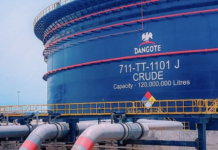By kehinde Emmanuel, ilorin

CG Custom
Stakeholders in the manufacturing sector have raised the alarm that abandonment of pre-inspection of goods at the point of entry has created leeway for smugglers to flood the Nigerian market with substandard products, including steel products.They also said it has made the nation’s borders and seaports porous,leading to influx of illegal arms and explosives into the country.According to them, such a development was inimical to national economic development and national security.They said it appeared that government security and revenue generating agencies as the Department of State Service, the Nigeria Police Force,the Nigeria Custom Service; the Standards Organization of Nigeria and Presidential Committee on Trade Malpractices have been either overwhelmed or ignorant of the nefarious activities of the smugglers.
He noted that the World Trade Organization is of the view that pre-shipment inspection is very important because it will help to safeguard national financial interest as it will prevent Customs dutyevasion, capital flight, and commercial fraud.
It could be recalled that pre-shipment inspection was formerly observed in Nigeria but was suspended in 2006 to give way to destination inspection. But the Chairman, Senate Committee on Customs Senator Hope Uzodinma sponsored Customs and Excise Management Act (CEMA as amendment) toNational Assembly in 2016 amongst other items which included the reintroduction of pre-shipment inspection. The move, according to the senator was intended to ensure increase in government revenue,reduction of illegal importation and stop ammunition trafficking.
The amendment bill to reintroduce pre-shipment inspection was passed and assented by President Muhammadu Buhari on June 2017.According to Clause 42 of CEMA 2017 amended, the Ministry of Finance has the duty to present the reintroduction of the pre-shipment inspection to the president for ratification.
After the President’s ratification, the Nigeria Customs and Excise Commission will set up the process if establishing the pre-shipment agencies and apparatus.
Pre-shipment inspection is expected to improve government revenue and boost the productivity of the Nigerian Customs. It will not cancel the capacity of energising the Nigeria Customs.It is also important to note that all importers in the country have been paying the mandatory 1% CISS, so the cost of setting up pre-shipment inspection mechanism is not burdensome to Nigeria.
Industry watchers have been worried and posed a question: ‘Since pre-inspection was suspended in Nigeria and importers have been paying 1% CISS, where has the revenue been going?’Port Harcourt, One and Calabar ports conduits of smugglers Investigations revealed that Port Harcourt, One and Calabar ports are being used by the smugglers to pursue their illegal activities.
Sources from the Galvanized Iron and Steel Manufacturers Association also confirmed that smuggling of substandard steel products and abandonment of pre-shipment inspection were worsening national insecurity.
They lamented that they they were killing the industry in Nigeria.Many of the operators in the industry who preferred anonymity lamented that the smuggled substandard steel products are freely traded in all markets in Nigeria.
It stated that given the grave dangers of the smuggling of steel products, the Federal Government of Nigeria should immediately direct all relevant ministries, departments and agencies such as the Nigeria
Custom Service, Standards Organization of Nigeria, Presidential Committee on Trade Malpractices and Department of State Security Service etc to immediately enforce all investors protective policy that will put a stop to the activities of these economic saboteurs.Nigeria loses N52bn yearly Investigation revealed that the Federal Government was losing about N52bn yearly to smugglers of steel products who use the Onne, Port Harcourt and Calabar ports.
GISMA also confirmed that FG was losing about N1bn revenue weekly ,adding that the loss is perpetuated because of neglect of pre-inspection of any container coming into the country which was hither-to the practice in Nigeria.
According to him, it is no gainsaying that the smuggled substandard steel products compete neck to neck with locally produced qualitative steel products in Nigrria.
GISMA said as a body under the Manufacturers Association of Nigeria has been battling for some time with what it called this dismal economic sabotage which may lead to the collapse of up to 60 per cent of manufacturers in the production of Galvanized Iron and Steel Manufacturing Companies in Nigeria.It added that it may also result to a mass lay-off of more than 50,000 direct employees and crystallization of numerous associated systemic risks in the Nigerian Steel Industry in a country where unemployment is already on the high side.
It pleaded with the presidency to immediately rescue the Nigeria steel industry from imminent collapse as a result of smuggling.
GISMA said, “There is a cartel of Economic Saboteurs who import huge volume of containers every week valued at about $5m which were never captured under the correct HS code 7210.30.00.00 – 7210.50.00.00 ofNigerian Customs Service portal, making the Federal Government of
Nigeria to loose an estimated revenue of about N1billion on weekly basis on these smuggled items due to the neglect of pre-inspection ofany container coming into the country which was hither-to the practice in Nigeria.
“The Galvanized Iron and Steel Manufacturing Companies have demonstrated absolute confidence in the Nigerian economy as evidenced by the establishment of verifiable mega steel millsin Nigeria . We have also demonstrated our trust in the Federal Government’s policy of Economic Growth and Recovery Plan via investments in various projects to enable import substitution for products. “It lamented that despite all the efforts of GISMA to ensure full achievement of the Federal Government’s strategic objectives of Economic Growth and Recovery Plan with key focus on global competitive economy, employment generation, youth empowerment and improved human capital development, the market is continually recording free flow of smuggled substandard steel products and other allied products.
It said that it was apt to note that the thickness and coating quality of all the smuggled roofing sheets are very much below the standard specified by Standards Organization of Nigeria (SON) for the Nigerian manufacturers, thereby short changing the Nigerian users as the imported products are less durable and of less quality.
According to GISMA, it has been verified that major routes of smuggling steel products, and especially galvanized and coloured corrugated roofing sheet into Nigeria are Port Harcourt, Onne and Calabar ports and all efforts to stop these economic sabotage has proved abortive over the years.
GISMA said it conducted a comprehensive study into the menace of smuggling and its economic deficit to our country Nigeria.It stated that it found out that importers open the Form M with WRONG classification HS CODE and product description.It added that mostly, the description is stated as used machinery and shoe parts which, it said, attracts zero duty and valid for foreign exchange.
According to it, the smugglers by this act successfully sabotage the economy with non-payment of the prescribed 45 per cent import duty on items of steel products being smuggled into Nigeria.It also said it was discovered that imported steel products are shipped in Containers and put on fast track and non-inspection category and escorted to their various warehouses around the country.
It explained that upon arrival of vessels in Port Harcourt, One and Calabar ports, sources claimed that no container examination is carried out from any of our reputable regulatory agencies.It said, “The activities of smugglers have largely dented the noble objectives of the Federal Government Economic Growth and Recovery Plan for the steel sector of the Nigerian economy.”Invariably, smuggling will continually be a determining factor of Nigeria’s economic independence because neither fresh local nor foreign investors will be pleased to invest in an economy where despite increasing growth in population and market demand, steel mills are shutting down while those still operating are doing so at less than 30% capacity.
” It is pertinent to remind all and sundry that these same factors mentioned above have led to the collapse of the once vibrant textile industry in Nigeria. ”
GISMA stated that it is its opinion that cancellation of Pre-shipment Inspection at all ports of shipment created a loop-hole for the smugglers.According to it, this is because no authorized agency is checking declaration document (Form M) of goods coming into Nigeria during containers’ stuffing.It pleaded that pre-shipment inspection should be re-introduced.





